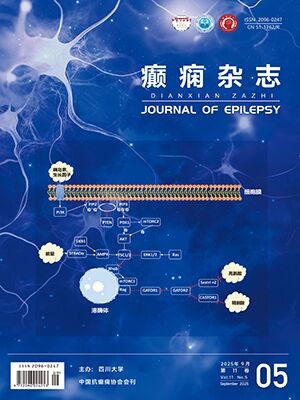| 1. |
吴逊, 沈鼎烈. 难治性癫痫. 中华神经科杂志, 1998, 31(1): 4.
|
| 2. |
Fiest Kirsten MKM, Sauro Khara M, Wiebe Samuel, et al. Prevalence and incidence of epilepsy: a systematic review and meta-analysis of international studies. Neurology, 2017, 88(3): 296-303.
|
| 3. |
Yang Jimmy C, Bullinger Katie L, Dickey Adam S, et al. Anterior nucleus of the thalamus deep brain stimulation vs temporal lobe responsive neurostimulation for temporal lobe epilepsy. Epilepsia, 2022, 63(9): 2290-2300.
|
| 4. |
王擒云, 戴体俊, 曾因明. GABAA 受体对内源性痛觉下行抑制系统的调控作用. 国际麻醉学与复苏杂志, 2004, 25(4): 209-212.
|
| 5. |
Schulze-Bonhage Andreas, Hirsch Martin, Knake Susanne, et al. Focal cortex stimulation with a novel implantable device and antiseizure outcomes in 2 prospective multicenter single-arm trials. JAMA Neurology, 2023, 80: 588.
|
| 6. |
Hirsch Martin, Coenen Volker Arnd, Schulze-Bonhage Andreas. Termination of seizures by ictal transcranial focal cortex stimulation. Epilepsia Open, 2023, 8(2): 673-677.
|
| 7. |
Nitsche MA, Paulus W. Excitability changes induced in the human motor cortex by weak transcranial direct current stimulation. The Journal of physiology, 2000, 527(Pt 3): 633.
|
| 8. |
Lefaucheur Jean-Pascal, Antal Andrea, Ayache Samar S, et al. Evidence-based guidelines on the therapeutic use of transcranial direct current stimulation (tDCS). Clinical Neurophysiology, 2017, 128(1): 56-92.
|
| 9. |
Boros Klára, Poreisz Csaba, Münchau Alexander, et al. Premotor transcranial direct current stimulation (tDCS) affects primary motor excitability in humans. European Journal of Neuroscience, 2008, 27(5): 1292-1300.
|
| 10. |
Morrell Martha J. Responsive cortical stimulation for the treatment of medically intractable partial epilepsy. Neurology, 2011, 77(13): 1295-1304.
|
| 11. |
Fisher Robert, Salanova Vicenta, Witt Thomas, et al. Electrical stimulation of the anterior nucleus of thalamus for treatment of refractory epilepsy. Epilepsia, 2010, 51(5): 899-908.
|
| 12. |
Ferguson Brielle, Glick Cameron, Huguenard John R. Prefrontal PV interneurons facilitate attention and are linked to attentional dysfunction in a mouse model of absence epilepsy. Elife, 2023, 12: e78349.
|
| 13. |
Proskurina Elena Y, Chizhov Anton V, Zaitsev Aleksey V. Optogenetic low-frequency stimulation of principal neurons, but not parvalbumin-positive interneurons, prevents generation of ictal discharges in rodent entorhinal cortex in an in vitro 4-aminopyridine model. International Journal of Molecular Sciences, 2022, 24(1): 195.
|
| 14. |
Smirnova Elena Y, Chizhov Anton V, Zaitsev Aleksey V. Presynaptic GABAB receptors underlie the antiepileptic effect of low-frequency electrical stimulation in the 4-aminopyridine model of epilepsy in brain slices of young rats. Brain Stimulation, 2020, 13(5): 1387-1395.
|
| 15. |
Wang ZX, Feng ZY, Yuan Y, et al. Suppressing synchronous firing of epileptiform activity by high-frequency stimulation of afferent fibers in rat hippocampus. CNS Neuroscience & Therapeutics, 2021, 27(3): 352-362.
|
| 16. |
Hotolean Eloise, Mazzola Laure, Rheims Sylvain, et al. Headaches provoked by cortical stimulation: Their localizing value in focal epileptic seizures. Epilepsy & Behavior, 2021, 122: 108125.
|
| 17. |
Cuello Oderiz Carolina, Von Ellenrieder Nicolás, Dubeau François, et al. Association of cortical stimulation-induced seizure with surgical outcome in patients with focal drug-resistant epilepsy. JAMA Neurology, 2019, 76(9): 1070-1078.
|
| 18. |
梁新宜, 练欢, 李欣, 等. 功能区胶质瘤术中直接皮层电刺激诱发癫痫发作1例. 中国神经精神疾病杂志, 2021, 47(7): 426-428.
|
| 19. |
Volfart Angélique, Yan Xiaoqian, Maillard Louis, et al. Intracerebral electrical stimulation of the right anterior fusiform gyrus impairs human face identity recognition. NeuroImage, 2022, 250: 118932.
|
| 20. |
Ryu Brendan, Nagappan Shivathmihai, Santos-Valencia Fernando, et al. Chronic loss of inhibition in piriform cortex following brief, daily optogenetic stimulation. Cell Reports, 2021, 35(3): 109001.
|
| 21. |
Loizon Marine, Ryvlin Philippe, Chatard Benoit, et al. Transient hypoxemia induced by cortical electrical stimulation: a mapping study in 75 patients. Neurology, 2020, 94(22): e2323-e2336.
|




